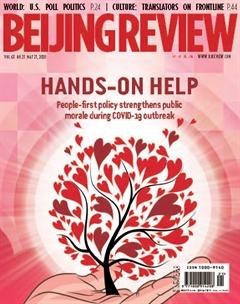GATHERING STEAM
By Li Xiaoyang
After resigning and returning to his hometown Daan County in Hunan Province in central China for a new job at the end of last year, 23-year-old Tian Wei met with difficulties in finding a new job due to the outbreak of the novel coronavirus. However, the predicament did not last long. With the help of the human resources department of the local government, Tian went to work for automaker BYD in Changsha, capital of Hunan, in car model production in March when enterprises across the country started to resume production.
“I once did similar work in Guangdong Province, south China. After joining BYD, I got about 2,100 yuan ($296) in around two weeks. That met my expectations,” Tian told Hunan Daily. According to him, before taking up his new job, he along with other new staff had been sent to a health examination by the local government.
BYD in Changsha resumed production on February 10 after the extended Lunar New Year holiday. Despite challenges caused by the delayed return of employees, shortage of raw materials and suspended transportation, it managed to resume work with the help of the local government, according to the company.
To ensure stable economic performance amid the epidemic, the central and local governments in China have provided consistent support over the past months to enterprises and individuals to resume business activities and overcome virus-induced difficulties. Besides facilitating businesses and introducing tax and fee reductions for enterprises, the government has given support to the mostaffected groups including migrant workers, graduates and farmers.
A boost to businesses
After the epidemic forced people to stay indoors, Laixianghui Dumpling, a restaurant chain based in Beijing, saw its business dwindle. But it was able to restore half of its normal delivery business by the May Day holiday, though the number of people dining at the restaurant was still only one third of the normal, Wang Tingjun, Chairman of the company, told Beijing Review.
“With the support of the government of Xicheng District, we have opened roadside booths with processed food that can be easily cooked. That brings a revenue of around 7,000 yuan ($988) per day to one of our restaurants in the district,” he said. While roadside booths were limited to prevent occupying pedestrian lanes, many regions eased the control during the epidemic to support the affected businesses.

As the epidemic caused disruptions in the transportation and marketing of agricultural products, the government enhanced efforts to stabilize agricultural production and encourage online sales to support farmers. Many local officials have attended live-streaming sessions to help boost sales of agricultural products. E-commerce through live-streaming has played a key role in helping reduce economic losses in Chinas virus-hit regions, especially Hubei, as people are encouraged to buy products from the province to help it turn the corner.
Zhou Lin, Deputy Mayor of Jingyu County in Jilin Province, northeast China, which shook off poverty this year, promoted local nuts through live-streaming on March 11, selling 36,500 kg of nut products in a single day.
“Since some farmers are unfamiliar with ecommerce, local officials participation in the livestreaming can enhance their confidence in trying the new mode and attract a large number of consumers in a short period of time,” Di Lake, Deputy Director of the in-house research institute of the e-commerce platform Pinduoduo, told National Business Daily.
Seeking solutions
Although enterprises and household business owners have accelerated business resumption, difficulties caused by the epidemic are still haunting them. “Problems such as shortage of funds and rising costs are not yet fully addressed for many SMEs. It will take time before offline sales completely recover,” Pan Helin, Acting Dean of the Digital Economy Institute at the Zhongnan University of Economics and Law, told Beijing Review.
The government needs to ease access to financing for businesses and drive up domestic demand. The key is to ensure employment and income, which will help sustain consumer spending, he stressed.
Enterprises and individuals are also encouraged to make endeavors to tide over the difficulties. As Pan suggested, SMEs and household businesses can adopt business modes such as live-streaming, delivery service and digital coupons to sharpen their edge, while foreign trade enterprises can tap into the domestic market to boost sales.

